"Why do I put things off so much?" You may have asked yourself this question a number of times, bewildered and upset by your propensity to put off things. Many people encounter procrastination, which can be perplexing and harmful to our productivity and well-being.
Examining the complex interaction of ideas, emotions, and behaviors that support this tendency is crucial to comprehending the psychology of procrastination and its root causes. The goal of this blog is to examine the psychological elements that contribute to our propensity to put things off.
We may learn a lot about our own inclinations and create powerful tactics to combat procrastination by analyzing the intricate web of factors that contribute to it, including fear, perfectionism, lack of drive, and more. We may find the solution to increased productivity, better time management, and a sense of achievement in our life by investigating the psychology and reasons for procrastination.
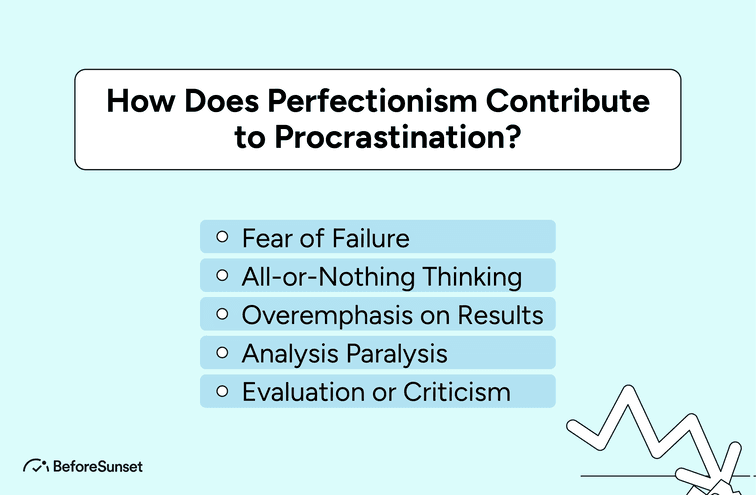
How Does Perfectionism Contribute to Procrastination?
Perfectionism may cause procrastination in a number of ways, including:
Fear of Failure: Perfectionists frequently hold themselves to high standards and worry that they won't live up to them. This worry about failing might cause anxiety and task avoidance. By putting off doing anything, one avoids having to face the prospect of falling short of their own expectations.
All-or-Nothing Thinking: Perfectionists have a propensity to think in absolutes, holding that anything must be completed either flawlessly or not at all. This strict way of thinking might overwhelm you and make it difficult to begin or finish things. In order to delay doing something until they feel they have the time or resources to complete it perfectly, they resort to procrastination.
Overemphasis on Results: Perfectionists frequently place an inordinate amount of emphasis on the outcome rather than the process. They can believe that their efforts are useless if they can't attain perfection. Tasks may seem overwhelming and unachievable with this attitude, which encourages procrastination as a safeguard against disappointment or apparent failure.
Analysis Paralysis: Perfectionists frequently overthink and scrutinize projects, trying to foresee and prepare for every conceivable consequence. This over-analyzing a situation might prevent progress and decision-making. When people believe they don't have enough information or confidence, they use procrastination as a strategy to put off making decisions or taking action. Fear of
Evaluation or Criticism: Perfectionists frequently worry about how other people will judge or critique their work. They may put off starting or finishing chores because they are afraid of being judged or criticized. They use procrastination as a defense against prospective criticism.
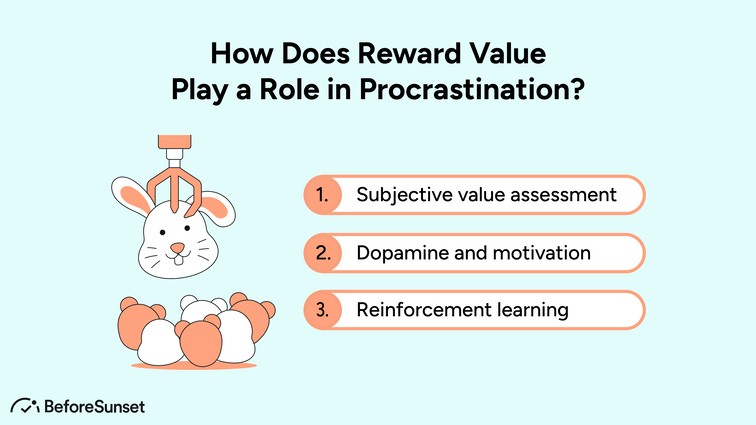
How Does Reward Value Play a Role in Procrastination?
Reward value significantly affects how tasks are prioritized according to the benefits they are thought to provide. People frequently choose tasks that offer immediate benefits or instant pleasure when presented with a choice of assignments.
The completion of tasks that have delayed benefits or are viewed as less enjoyable is commonly put off or avoided. It might be difficult to resist the desire to start or finish less enjoyable chores instead of delightful ones due to the appeal of instant gratification.
Additionally, people evaluate tasks' worth subjectively depending on the benefits they associate with them. A task is more likely to be put off if it is thought of as unimportant or less rewarding. Tasks viewed as being extremely gratifying, entertaining, or in line with personal interests and beliefs, on the other hand, tend to be given priority and finished right away.
Overall, the perceived incentive value has a significant impact on people's judgments about task involvement and increases the propensity to put off tasks.
Is Procrastination a Sign of Laziness?
No, delaying tasks is not always indicative of laziness. Laziness refers to a general lack of drive or effort to engage in any activities or tasks, whereas procrastination entails delaying or postponing chores. On the other hand, procrastination frequently entails intentional decision-making and involvement in other activities as a means of avoiding or delaying specified duties.
There are several underlying causes of procrastination, including inadequate time management, failure phobia, perfectionism, overload, and lack of clarity. It could also stem from a lack of motivation or interest in a certain endeavor.
Many times, people who put off doing their work instead prioritize instant pleasure or take on activities that are more pleasurable or less challenging. It's critical to keep in mind that procrastinating can have detrimental effects on productivity and wellbeing.
Labeling procrastination as lazy, however, oversimplifies the complex aspects involved and may make it difficult to comprehend and treat the root reasons. People may overcome procrastination and increase their productivity by understanding the causes of it and putting tactics for improved time management, motivation, and goal-setting into practice.
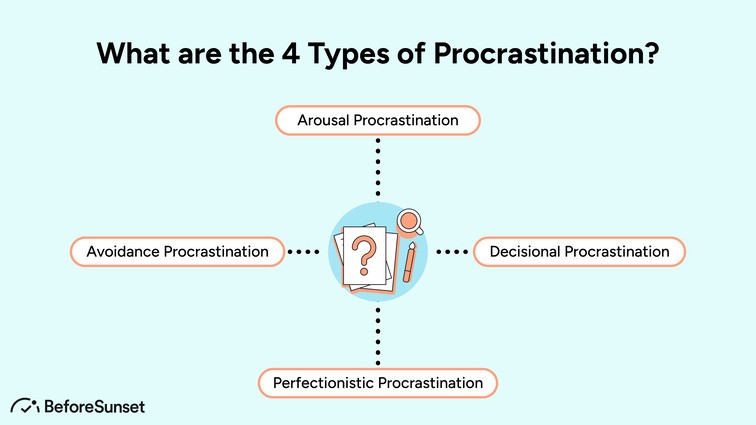
What are the 4 Types of Procrastination?
Different procrastination styles can be categorized and described in different ways. Based on the motivations underlying the practice, one common classification proposes four categories of procrastination. These kinds include:
Arousal Procrastination: Arousal procrastination is the practice of delaying things until the very last minute because the procrastinator enjoys the strain. They discover that the rush of adrenaline and sense of urgency enhance their performance. However, this could result in more stress and lower-quality work since the time constraints might make careful planning and execution difficult.
Avoidance Procrastination: Avoidance procrastination is when someone deliberately avoids or puts off doing something because they are afraid, anxious, or uncomfortable about it. It could be a result of insecurity, dread of criticism, or fear of failure. In order to avoid the work at hand, avoidance procrastinators may indulge in other activities or diversions.
Decisional Procrastination: The propensity to put off making decisions is referred to as decisional procrastination. Decisional procrastinators may battle with indecision, worry about making the incorrect decision, or feeling overloaded with choices. They could continually put off making decisions, which would cause delays and more stress.
Perfectionistic Procrastination: Perfectionistic procrastination is when people put off starting or finishing things because they have high standards and a drive for perfection. Before acting, they could take an inordinate amount of time to prepare, do research, or look for the optimal circumstances. The anxiety of falling short of their own high standards can result in a vicious cycle of procrastination and difficulties starting or completing projects.
It's crucial to remember that people may display a combination of these procrastination styles or engage in various procrastination styles at various times. Understanding the fundamental causes of procrastination might help people recognize their behaviors and come up with solutions to deal with them.
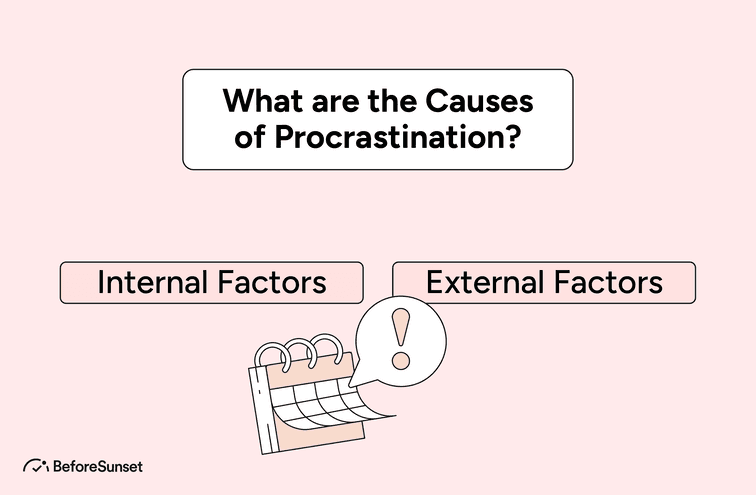
What are the Causes of Procrastination?
Many people suffer procrastination, or the act of delaying or postponing work, at some time in their life. Understanding the fundamental reasons for procrastination can provide light on why people participate in this behavior and help build techniques to overcome it, despite the fact that it may appear annoying and unhelpful.
Procrastination has several root reasons, and each individual will experience them differently. They can include impatience and a lack of drive, as well as poor time management abilities and a fear of failing. We will examine the numerous causes of procrastination in this article, including how psychological, emotional, and environmental variables affect this prevalent tendency.
Understanding the reasons behind procrastination helps people better understand who they are and create tactics to break the habit, which in turn increases productivity and personal fulfillment.
1. Internal Factors
The root reasons for procrastination are heavily influenced by internal variables. These elements are influenced by a person's ideas, feelings, beliefs, and personality traits. Perfectionism, when people establish unrealistically high expectations for themselves and worry about falling short of those goals, is a significant internal issue.
Tasks may be put off until the "perfect" circumstances are present due to this fear of failing or making mistakes. Fear of failure or success is another internal issue, where people may be terrified of the possible repercussions of either failing or excelling. This worry may lead to uncertainty and anxiety, which makes people put off duties in order to avoid having to deal with those results.
Low self-efficacy and self-confidence can also cause people to put off starting activities because they may mistrust their capacity to do so, which causes avoidance and delay. Procrastination may also stem from a lack of intrinsic desire or interest in an activity, which can make it difficult to start or maintain an effort. These internal elements emphasize the intricate interaction of feelings, attitudes, and beliefs that fuel procrastination tendencies.
2. External Factors
External factors also play a significant role in the causes of procrastination. These factors are related to the environment, circumstances, and external influences that individuals encounter.
The presence of distractions such as social media, entertainment, or other engaging activities can divert attention and make it easier to procrastinate. External temptations provide immediate gratification and can compete with the long-term goals or tasks at hand.
When individuals lack clear goals or a structured plan, it can be challenging to prioritize tasks effectively. Without a clear roadmap, individuals may feel overwhelmed, leading to procrastination as they struggle to determine where to start or how to proceed.
The absence of external accountability or deadlines can contribute to procrastination. Without external pressure or consequences, individuals may delay tasks or postpone them indefinitely.
Excessive workload or tight time constraints can make tasks appear daunting or unmanageable. Feeling overwhelmed by the amount of work can lead to avoidance and procrastination as individuals struggle to cope with the perceived demands.
Insufficient support or resources can hinder progress and contribute to procrastination. Without the necessary tools, information, or assistance, individuals may delay tasks until they have access to the required resources.
What are the Psychological Effects of Procrastination?
Procrastination can have various negative psychological effects on individuals. One of the most prevalent effects is increased stress and anxiety. As tasks and deadlines accumulate, the pressure to complete them within limited timeframes intensifies, leading to heightened levels of stress and a constant feeling of being overwhelmed.
Additionally, procrastination often results in decreased self-esteem and self-worth. Failing to meet personal expectations and constantly delaying tasks can erode one's confidence and belief in their abilities, leading to feelings of guilt, frustration, and self-criticism.
Moreover, the cycle of procrastination can fuel a negative feedback loop where individuals feel trapped and unable to break free from the habit, causing a sense of powerlessness and a diminished sense of control. Overall, the psychological effects of procrastination can significantly impact individuals' well-being, mental health, and overall productivity.
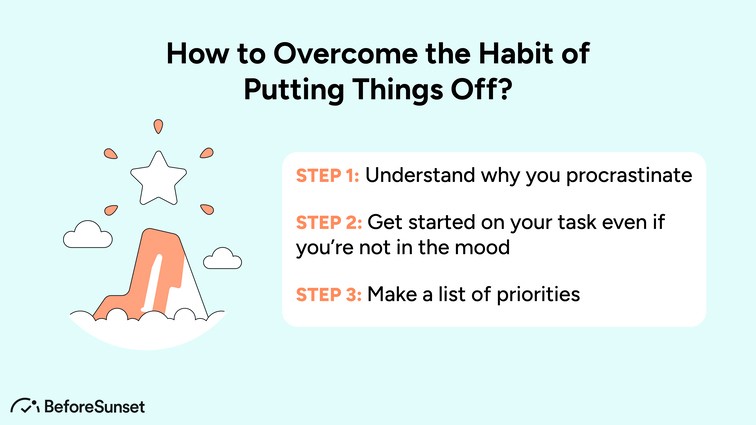
How to Overcome the Habit of Putting Things Off?
Procrastination, sometimes known as postponing pleasure, can have significant consequences. You may be more productive, experience less stress, and feel more accomplished if you can resist procrastinating, whether it means delaying vital chores, delaying personal objectives, or always feeling burdened by incomplete work.
The purpose of this post is to provide readers with advice on how to stop putting off critical activities and start performing them right away. The ability to recognize the core causes of procrastination, address those causes, and then employ effective methods and mental shifts to deal with them affects one's ability to take charge, raise motivation, and establish habits that promote timely and successful work completion.
Whether you procrastinate seldom or regularly, the suggestions and solutions provided here will assist you in breaking the habit and regaining your time and productivity.
Step 1: Understand why you procrastinate
Understanding why you delay is a necessary step toward breaking this widespread behavior. Procrastination can have a variety of underlying causes, and understanding these causes can assist you in developing specific ways to overcome them.
It is critical to examine your procrastination tendencies and the causes at play. It might be failure fear when the worry of not reaching expectations keeps you back. Perfectionism may play a role, as you postpone work in search of the "perfect" timing or conditions.
Procrastination can also be caused by a lack of ambition, unclear goals, or feeling overwhelmed. By recognizing the exact causes of your procrastination, you may take proactive steps to address the underlying problems and establish effective tactics for breaking the habit.
Step 2: Get started on your task even if you’re not in the mood
Procrastination may be defeated by starting a task even when you're not in the mood for it. Waiting for the ideal moment or a flash of inspiration may frequently result in unneeded delays and wasted chances. You build momentum and improve your chances of beating inertia by starting the work and taking action.
Even taking baby steps toward a goal might help you change your perspective and become more motivated as you feel like you're making progress. Furthermore, you could discover that once you start working on the activity, your initial reluctance or lack of motivation vanishes and you start to become more involved and concentrated.
Remember that action usually follows motivation, so no matter how you're feeling right now, taking that initial move might put you on the road to productivity and success.
Step 3: Make a list of priorities
A useful approach for organizing chores and avoiding procrastination is making a list of priorities. By making a list of your priorities, you may more clearly see what has to be done and better spend your time and energy. Start by determining the tasks that are most crucial and urgent and demand immediate attention.
Take into account obligations, timeframes, and the effect that each activity could have. Next, classify activities according to their significance, taking into account elements like long-term objectives, individual values, and the possible results of doing each work. You may prioritize your work and complete larger projects more quickly and effectively by breaking them down into smaller, more manageable jobs.
You may concentrate your energies on what really counts, keep organized, and feel accomplished as you complete your activities in order of priority by having a well-structured list of priorities.
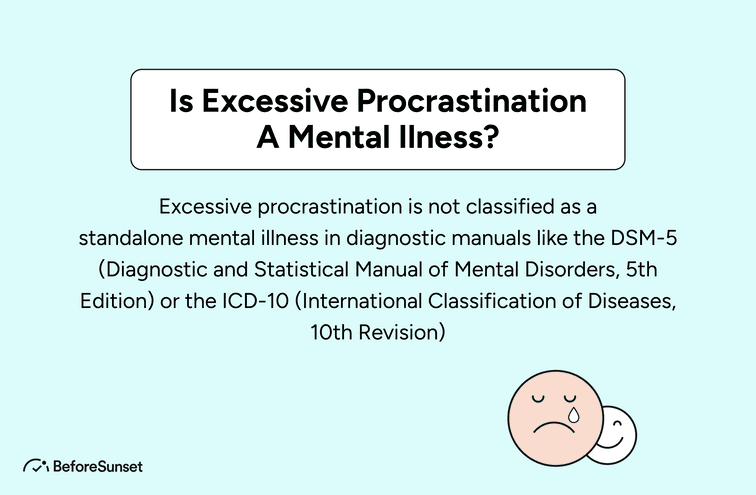
Is Excessive Procrastination A Mental Ilness?
Procrastination is a behavior where individuals delay or put off tasks, often leading to negative consequences or increased stress. While procrastination can be a symptom of an underlying mental health issue, it is not classified as a standalone mental disorder in the Diagnostic and Statistical Manual of Mental Disorders (DSM-5) or the International Classification of Diseases (ICD-10).
However, chronic and severe procrastination can be associated with various mental health conditions, such as:
Depression: Lack of motivation and difficulty initiating tasks are common symptoms of depression, which can contribute to procrastination.
Anxiety: Anxiety can lead to avoidance behaviors, including putting off tasks due to fear of failure or overwhelming feelings.
ADHD (Attention-Deficit/Hyperactivity Disorder): Individuals with ADHD may struggle with executive function skills, making it challenging to organize and prioritize tasks effectively.
Perfectionism: Some people procrastinate because they fear they won't meet their high standards, leading them to delay tasks indefinitely.
Obsessive-Compulsive Disorder (OCD): In some cases, OCD-related perfectionism or fear of making mistakes can contribute to procrastination.
It's essential to understand that procrastination can have multifaceted causes, and it's not always directly linked to a mental health condition. Sometimes, it can be a habitual behavior or a result of poor time management skills.
If procrastination is significantly impacting your daily functioning and well-being, seeking support from a mental health professional can be beneficial. They can help identify any underlying issues and provide appropriate strategies to address the procrastination behavior. Additionally, they can assist in managing any potential mental health concerns that might be contributing to the problem.
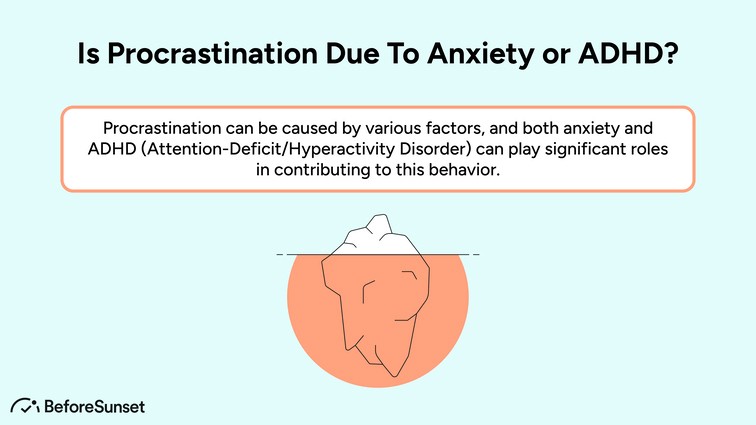
Is Procrastination Due To Anxiety or ADHD?
Procrastination can be influenced by various factors, and both anxiety and ADHD can contribute to the tendency to procrastinate. Let's explore how each of these conditions may play a role:
Anxiety and Procrastination: Anxiety can manifest in different ways, one of which is avoidance. When individuals feel anxious about a task or situation, they may procrastinate as a way to cope with those uncomfortable feelings. The fear of failure, negative outcomes, or not meeting high standards can lead to a desire to delay tasks, as a means of avoiding potential stress or disappointment. In this case, procrastination serves as a short-term relief from anxiety but can exacerbate stress in the long run due to the accumulating tasks.
ADHD and Procrastination: ADHD affects executive functioning skills, which include abilities like planning, organizing, and time management. Individuals with ADHD may struggle with initiating tasks and sustaining focus, leading to a higher likelihood of procrastination. The difficulty in prioritizing and breaking tasks into manageable steps can make it challenging for individuals with ADHD to start or complete tasks on time.
It's essential to note that procrastination is a complex behavior with multiple potential causes, and not all cases are directly related to anxiety or ADHD. Other factors such as perfectionism, low motivation, lack of interest, or poor time management skills can also contribute to procrastination.
Furthermore, procrastination can become a self-reinforcing cycle. As tasks are delayed, they may become more overwhelming, leading to increased anxiety and exacerbating ADHD-related difficulties.
If you or someone you know is struggling with chronic and distressing procrastination, seeking professional support is recommended. A mental health professional can conduct a thorough assessment to identify the underlying factors contributing to procrastination and provide personalized strategies to address them effectively. Whether it's related to anxiety, ADHD, or other factors, understanding the root causes can lead to targeted interventions to improve productivity and well-being.
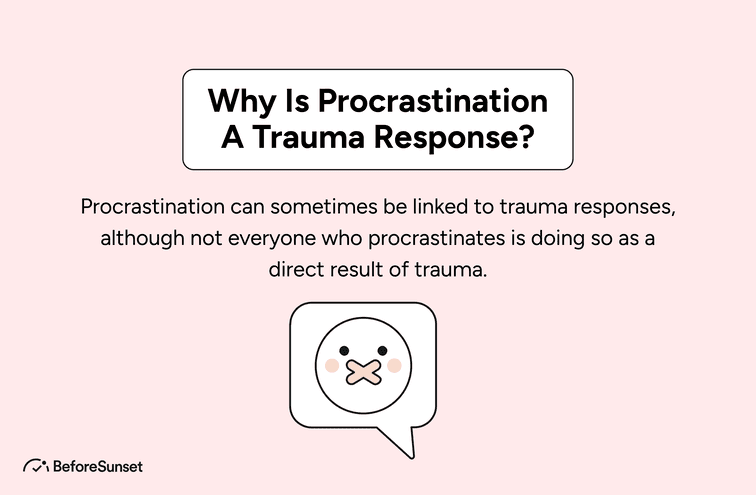
Why Is Procrastination A Trauma Response?
For a number of reasons, procrastination can be a trauma reaction. Trauma can cause the brain to alter as a protective mechanism, which might modify behavior and coping mechanisms. Avoiding events or stimuli that can cause the person to remember the traumatic incident is one method to avoid procrastination.
They might temporarily feel in control of the situation and separate themselves from potentially upsetting circumstances by delaying activities or obligations. Trauma can also impair emotional regulation, which makes it challenging to concentrate and work on activities.
Procrastination and avoidance can also be exacerbated by a person's fear of failing or conviction that they lack the necessary skills as a result of prior trauma. Trauma may also impact one's sense of value and self-esteem, which can make it difficult to stay motivated to work toward objectives.
Overall, putting off tasks when dealing with trauma might be an effort to control emotional pain and defend oneself from imagined dangers. Overcoming procrastination and fostering general well-being require addressing the underlying trauma and creating good coping strategies.
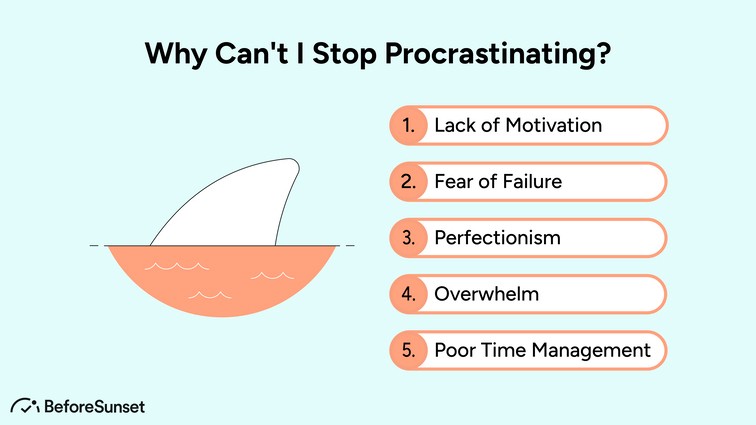
Why Can't I Stop Procrastinating?
Procrastination can be caused by a confluence of psychological, emotional, and behavioral variables. The seduction of immediate alleviation is one important component. Procrastination provides an instant reward in the form of diversion or avoidance from duties that may be seen as onerous, monotonous, or anxiety-inducing.
Additionally, procrastination may be caused by a lack of objectives or a sense of direction, making it challenging to efficiently prioritize chores. Inability to divide work into manageable pieces and poor time management abilities might make the issue worse.
Additionally, underlying problems like poor self-esteem, self-doubt, or a fear of achievement may be at play because procrastination is a strategy for avoiding difficulties or criticism. Understanding the underlying causes of procrastination, increasing self-awareness, implementing efficient time management strategies, and removing any emotional or psychological obstacles that may be causing the behavior are frequently necessary for success.
Developing techniques to end the pattern of procrastination can be helped by seeking guidance from a therapist, counselor, or coach.
Should I See A Therapist for Procrastination?
Seeking help from a therapist or counselor might be a wise move if procrastination has a substantial negative influence on your daily life, productivity, and general well-being. You can examine any emotional or psychological issues that may be influencing your procrastination with a therapist, who can also assist you in understanding the underlying causes of your behavior.
They can collaborate with you to create individualized plans and coping skills to deal with procrastination. A therapist may also help with developing self-awareness, strengthening motivation, and developing time management skills. A therapist may offer direction and assistance in breaking free from the pattern of procrastination and working toward a more contented and successful life, regardless of whether procrastination is linked to worry, poor self-esteem, perfectionism, or other problems.
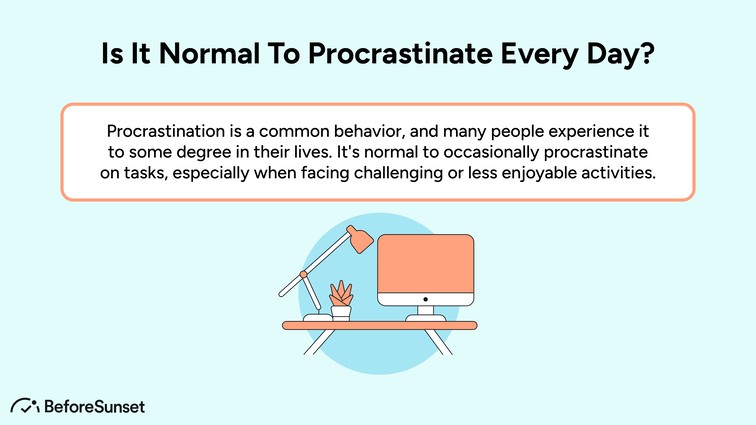
Is It Normal To Procrastinate Every Day?
Most people occasionally engage in the prevalent practice of procrastination to some extent. Regular procrastination is accepted as normal and may not have many detrimental effects. However, procrastination may be reason for concern if it develops into a regular practice that prevents you from meeting obligations, achieving your objectives, or leading a balanced life.
Procrastination that is chronic and excessive can cause tension to rise, deadlines to be missed, as well as feelings of guilt or irritation. Even while everyone occasionally puts things off, it's important to spot when procrastination turns into a destructive habit.
It might be helpful to seek support from a therapist or counselor in identifying and resolving the underlying issues leading to the habit if you often struggle with everyday procrastination and it is harming your general functioning and well-being.
What Is The Last Minute Syndrome?
The term "Last Minute Syndrome" describes a pattern of conduct in which people routinely put off finishing duties or responsibility until the very last minute. People who suffer from this illness frequently flourish under the stress of approaching deadlines, feeling an increase in drive and concentration as the clock ticks down.
Even while some people think they work better under pressure, the last-minute syndrome can result in stress, lower-quality work, and the loss of chances for good planning and preparation.
This behavior is characterized by persistent procrastination, and while it may be beneficial for certain people, it may also have unfavorable effects on other people and make them feel more anxious. The core reasons of procrastination must be understood in order to combat the Last Minute Syndrome. Additionally, productive techniques other than depending on the pressure of approaching deadlines must be found.
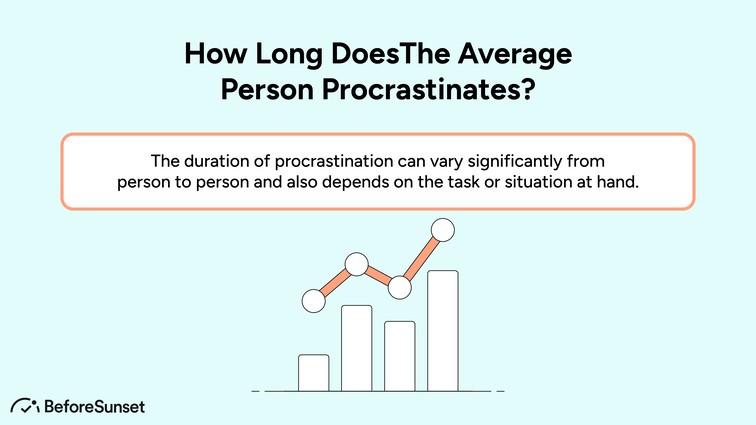
How Long Does The Average Person Procrastinates?
The duration of procrastination can vary widely among individuals and depends on the complexity of the task, personal tendencies, and external factors. It's challenging to determine an exact average time for procrastination, as it can range from a few minutes to several days or even longer.
For simple tasks or minor decisions, procrastination might only last a short time, such as a few minutes or hours. However, for more complex or daunting tasks, procrastination can extend for days, weeks, or even months.
Additionally, chronic procrastinators may struggle with persistent delays across multiple tasks, leading to a significant impact on their daily lives and productivity. It's important to note that procrastination is a multifaceted behavior influenced by various factors, and the average duration can differ from person to person. If procrastination is becoming a significant issue, seeking support and strategies to address the behavior can be beneficial.
How Do I Stop Compulsive Procrastination?
Finding the causes of your procrastination is the first step in overcoming excessive procrastination. Set definite objectives with due dates and divide activities into manageable, smaller phases. To stay focused, use time management strategies like the Pomodoro Technique.
Reduce interruptions, institute a system of rewards for accomplishments, and engage in self-compassion exercises to combat destructive self-talk. Utilize responsibility by discussing your goals with others and seeing yourself completing the task successfully. Set priorities, restrict your options, and break bad habits.
Practice mindfulness to refocus your urges and, if necessary, get help from a professional. Applying these techniques consistently, combined with patience and tenacity, will assist you in overcoming obsessive procrastination and improving your productivity.
The Procrastination Monster: Why We Put Things Off and How to Slay It
We've all been there. That looming deadline, the unpleasant task we keep pushing aside, a swirl of negative emotions bubbling up just thinking about it. This aversion to starting, often accompanied by negative feelings, isn't just laziness – it's a complex interplay of psychology and brain activity.
Science tells us that when faced with a difficult task, the prefrontal cortex, responsible for planning and self-control, gets hijacked by negative emotions. This can lead to self-regulation failure, making it near impossible to initiate the task. The fear of an unpleasant experience, the outcome delay (even a 1-week deadline feels far away!), all contribute to this avoidance behavior.
Effort People vs. Non-Effort People:
Some individuals, known as effort people, thrive on the satisfaction of a job well done. They're willing to invest the extra effort for long-term benefits. However, others, wired differently, might struggle with tasks that lack concrete goals. Abstract goals, often characteristic of bad goals (e.g., "be more organized"), lack the specificity to trigger motivation.
Breaking the Cycle: A Combination of Techniques
The good news? Procrastination isn't an unbeatable foe. By understanding its underlying mechanisms, we can develop a combination of techniques to slay the procrastination monster.
Set SMART Goals: Replace abstract goals with concrete goals (Specific, Measurable, Achievable, Relevant, and Time-bound).
Identify Key Traits: Reflect on your key traits and potential underlying behaviors that contribute to procrastination. Maybe you get overwhelmed by choice overload or rely on active procrastination (busying yourself with unimportant tasks) as a coping mechanism.
Develop an Action Plan: Create a clear action plan, breaking down the task into smaller, manageable chunks. This reduces the perceived effort and makes it less daunting.
Harness Positive Emotions: Remember, finishing a task brings a sense of accomplishment and positive feelings. Tap into the habit loop by linking the task completion with a pleasurable activity as a reward.
Social and Situational Factors:
Don't underestimate the impact of social factors. Studying alongside a friend or having a designated co-working space can provide structure and accountability. Similarly, energy levels play a role. Schedule demanding tasks for times when you have the most physical energy.
Chronic vs. Active Procrastination:
There are different types of procrastinators. Chronic procrastinators habitually put things off, often leading to negative consequences. Active procrastinators wait until the last minute but manage to pull it off (often with a surge of adrenaline!). While this might work for a while, it's not a sustainable strategy.
Understanding the Task Itself:
The type of task itself can also influence procrastination. Tasks requiring future effort are more likely to be delayed compared to those offering immediate gratification. Consider incorporating enjoyable activities within the task itself to increase motivation.
Beyond "Just Do It":
Procrastination isn't just about laziness. It's a complex interplay of brain activity, emotional responses, and situational factors. While a bit of dawdling might benefit a university student cramming for an exam (imperfect action is better than no action!), chronic procrastination can be detrimental to our well-being.
Understanding the benefits of overcoming procrastination goes beyond just meeting deadlines. It's about self-compassion, recognizing the psychological factors at play, and developing a toolbox of strategies to choose from. Remember, it's not about achieving perfection, but about making current decisions that lead to a future free from the burden of chronic procrastination.
Book Recommendation: If you want to delve deeper, check out "Book Procrastination" by Piers Steel. This book explores the psychology behind procrastination and offers practical strategies to overcome it.
Breaking Free from the Cycle: Strategies to Slay Chronic Procrastination
We explored the psychological underpinnings of procrastination, but how do we actually break free from its grip, especially for habitual procrastinators? Let's delve deeper into specific strategies:
Affective Forecasting and the Power of "Imperfect Action":
Our brains are wired for instant gratification. Affective forecasting refers to our tendency to overestimate the negative emotions associated with a task and underestimate the positive feelings of completion. This can lead to chronic procrastination as we avoid the perceived unpleasantness.
The key is to challenge these negative forecasts and embrace the concept of imperfect action. Doing something, even if not perfect, is far better than doing nothing at all. Taking a small step towards the task, like outlining the first point, can break the inertia and reduce the perceived burden.
Combating Decision Fatigue:
Decision fatigue is a real phenomenon. The more decisions we make throughout the day, the less willpower we have left for important tasks. For habitual procrastinators, this can lead to delaying the decision to begin the task in question altogether.
Here's how to combat decision fatigue:
Schedule Demanding Tasks Strategically: Schedule demanding tasks for times when you're mentally fresh, typically earlier in the day. This allows you to tackle the more challenging decisions while your willpower is strong.
Create Routines: Establish routines for recurring tasks. This reduces the decision fatigue associated with repeatedly deciding what to do next.
Challenging the "Benefits" of Dawdling:
Habitual procrastinators often convince themselves that last-minute cramming or a surge of adrenaline-fueled productivity benefits them. While there might be a temporary sense of accomplishment, the long-term consequences of chronic procrastination are far more detrimental.
Cognitive Evaluation:
Shift your cognitive evaluation of the task. Focus on the benefits of completing the task, not just the perceived unpleasantness. Will finishing this project liberate your mental space for something more enjoyable? Will it reduce future stress? Reframing the task in a positive light can boost motivation.
Remember, overcoming chronic procrastination is a journey, not a destination. Be patient with yourself, celebrate small wins, and implement these strategies consistently. With time and effort, you can break free from the cycle and experience the satisfaction of completing tasks on time, free from the burden of negative feelings.
Conquer Procrastination and Slay Your To-Do List with BeforeSunset AI
We all know the feeling. That looming deadline, the ever-growing to-do list, and a voice in our heads whispering, "Maybe just a little later..." Procrastination, the thief of time, can steal our productivity and leave us feeling overwhelmed. But fear not, fellow warriors against procrastination! BeforeSunset AI is here to be your secret weapon.
BeforeSunset AI tackles procrastination on two key fronts: planning and self-awareness. Here's how it helps you conquer those lingering tasks:
Defeating the Scheduling Monster with Time-Blocking:
Procrastination often thrives on a cluttered schedule. BeforeSunset AI's time-blocking feature empowers you to create a clear, structured plan for your day. Whether you choose to use the AI Assistant or build your schedule manually, time-blocking ensures each task has a dedicated time slot, minimizing the urge to push things off.
Tracking Time to Identify Procrastination Triggers:
Do certain tasks consistently get pushed aside? BeforeSunset AI's built-in time-tracker provides valuable insights. Track the time you spend on each task and identify patterns. Are there specific projects that trigger procrastination? By understanding your personal triggers, you can develop strategies to tackle them head-on.
Personal Analytics: Unveiling Your Productivity Kryptonite:
The Personal Analytics screen within BeforeSunset AI goes beyond just time tracking. This powerful feature provides a productivity score and detailed insights into your workflow. These insights can reveal procrastination tendencies you might not have been aware of.


